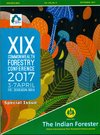The Role of Decentralized Local Institutions in Sustainable Forest Governance in the Mount Oku Area, North West Region Cameroon
DOI:
https://doi.org/10.36808/if/2017/v143i9/118886Keywords:
Oku Forest Area, Local Institutions, Cameroon, Decentalized Forest Goverance.Abstract
Local institutional arrangements are among the most appreciated reforms of decentralized natural resource policies. This study focused on the local institutional associated contributions and the management in the Mt Oku forest area after management rights were devolved to the community. The institutional analysis and development framework was used to study the institutional conditions appropriate to effective decentralized forest governance and how these relate to sustainability. The framework guided the development of testable hypotheses for the identification and ranking of community activities that leads to forest degradation. It also examines the extent of forest exploitation viz-a-viz the role of local institutions, and assesses the variation of local occupations before and after the introduction of Forest Management Institutions (FMI) as they influence livelihood strategies. The Pair-sample "t" test was used to test significant differences. The student t-test value stood at 4.83 at the 95% confident interval; indicating a reduction in the exploitation of forest resources. Similarly, there was a significant (p = 0.000) variation in the occupation of indigenes after the introduction of Forest Management Plan (FMP). It is concluded that local institutions contributes tremendously in resource governance and conservation in the Mount Oku area but would be more successful when the system governance actors enjoy favorable conditions for information exchange and learning. There is therefore, the need to build the capacity of stakeholders in the area.References
Asanga C. (2002). Community forest management at the Kilum-Ijim mountain forest region, Cameroon. FAO working paper, Rome,. Conservation and Sustainable Management. 42 pp
Barr C. (2002). Decentralization of the forest administration in Indonesia: Implication for Forest Sustainability, Community Livelihoods and Economic Development. Bongor, Indonesia.
Colfer C. and Capistro D. (2005). The politics of decentralization: Forest Power and People. Earth scan, London.
Furon R. (1963). Geology of Africa. Edinburg: Oliver and Boyd.
Ministry of Environment and Forestry (MINEF) (1994). Law No.94/01 of 20 January, to lay down forestry, wildlife and fisheries regulations. Yaoundé: Ministry of Environment and Forestry, Cameroon.
Ministry of Environment and Forestry (MINEF) (1998). Manual of Application of the procedure for the attribution and norms of the management of community forest, Cameroon. Yaoundé: Ministry of Environment and Forestry.
Neba A.S. (1982). Modern geography of the United Republic of Cameroon.New York: Hamilton Printing Company.
Numbem S.T. (1985). The conservation of Oku mountain forest, Cameroon. Cambridge: International Council for Bird Preservation.
Downloads
Downloads
Published
How to Cite
Issue
Section
License
Unless otherwise stated, copyright or similar rights in all materials presented on the site, including graphical images, are owned by Indian Forester.





